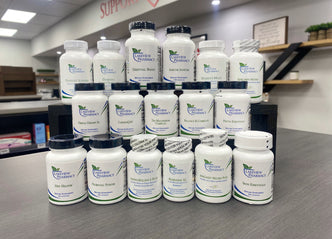If you’ve had any kind of health insurance plan in the last 30 years, you’ve likely been exposed to the work of pharmacy benefit managers (PBMs) whether you’ve realized it or not. But what are they? What do they do? And why has there been increased scrutiny of their practices in recent years?
Watch the video below to learn more about pharmacy benefit managers and why working with a local, trusted pharmacy remains essential despite the PBM influence on the marketplace.
What Is a Pharmacy Benefit Manager?
In short, pharmacy benefit managers are companies that act as third-party administrators hired by health plans, large employers, unions, and government entities to manage prescription drug benefits programs.
You can think of PBMs as middlemen. They are hired by the patient’s insurance company to arrange the delivery and sale of prescriptions to the pharmacy. The pharmacy delivers the drugs to the patients, and the PBM reimburses the pharmacy for dispensing the prescription.
Originally intended to process claims on behalf of clients, PBMs filled a needed niche at the start. The collective buying power — pharmacy benefit manager companies represent consumers from multiple insurers and employers — wielded by PBMs would, in theory, reduce health care costs and pass the savings on to consumers.
The Problem with PBMs
Pharmacy benefit managers are supposed to parlay their management tools, price concessions, and formulary power to benefit the insurers they serve, which are then supposed to pass on the savings to their own customers through better benefits and lower premiums.
But as PBMs became bigger, and more profit-driven as publicly traded companies with share-holders, the lower costs to insurers never materialized. Through acquisitions and consolidations, three large PBMs — CVS, Express Scripts, and UnitedHealth’s Optum — now account for more than 70 percent of all the drug benefit claims in the country. And despite that consolidation, prices have skyrocketed.
In 1986, the cost of prescription drug benefits in the United States was at $26.8 billion. By 2016, the most conservative estimates had that number eclipsing $320 billion — well above a 1,000-percent increase. The average out-of-pocket expense for a patient to cover drug benefits has increased by more than 170 percent over the same span.
Through their use of fees, rebate programs, and spread cost techniques, PBMs have been able to blossom as a money-making enterprise. But they haven’t been able to deliver better service to patients or lower costs to insurers.
Pharmacy benefit managers cull profit from the system with the fees they charge insurers for their service. But PBMs have drawn more scrutiny of late for their reliance on rebates and spread pricing.
PBMs have been accused of relying on rebates, rather than the best value drugs (efficiency and cost), to pick those that land on its formulary lists. For example, if a drug costs $100 and offers the PBM a $50 rebate (that the PBM is allowed to keep), it is more likely to be selected for use by the PBM than a drug that offers the same benefits for a $20 overall cost with no rebate.
Spread pricing, meanwhile, is where PBMs are reimbursed by health plans for a higher price for generic drugs than what the PBMs actually pay pharmacies for these drugs, and pharmacy benefit managers keep the difference. The payments PBMs generate for pharmacies are kept confidential from health plans. If your PBM pays your pharmacy $10 to fill a prescription, but it charges the health plan $50 to fill it, it would pocket the difference.
Lakeview Pharmacy Remains Proudly Independent
For more than 40 years, Lakeview Pharmacy has served Racine, Wisconsin and the surrounding area with one simple goal: to serve the patients in its care.
With the level of manipulation taking place within the system — in Ohio, for instance, an investigation found PBMs cut reimbursement to local pharmacies while then offering to buy them out — you can rely on Lakeview Pharmacy to serve you. There are no shareholders, or subsidiaries, or mergers.
As more PBMs and national drugstore chains begin to merge, and offer up obvious conflict-of-interest scenarios, Lakeview Pharmacy remains steadfast in being local, from ownership to the those handling your pharmaceutical needs on a daily basis.
And, as Consumer Reports noted in 2018, many customers still prefer the friendly service that a local pharmacy provides. Using a local pharmacy also could lead to lower prices as a pharmacist who knows you and your needs is far more likely to recommend a lower-cost alternative to suit your needs.
It’s that commitment to customer service that has allowed Lakeview Pharmacy to continue to thrive despite the consolidation prevalent in the pharmacy benefit manager field.
Contact Us for All Your Pharmaceutical Needs
Lakeview Pharmacy believes the more you know about your own health care, the better. You can find an assortment of information related to the drug benefits industry at our website. We offer a delivery service, an assortment of long-term care options, and a wide assortment of specialty products.
Contact us to find out more about how we can help you today.


